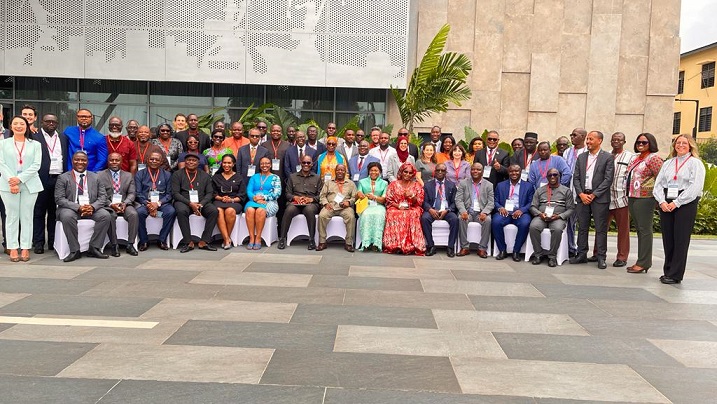Accra, 18th September 2023 – Ken Ofori-Atta, Minister for Finance has assured that government is committed to continuous streamlining tax expenditure regime whiles at the same time find sustainable ways to provide incentives to support businesses and the vulnerable in society.
He noted that tax exemptions were highly distortive and costly, to this end, he called on governments in the sub-region to implement the UN resolution on tax expenditure while at the same time make efforts to reduce distortions caused by internal policies.
“In so doing, we must put in place systems to catalogue, measure, and evaluate tax expenditures. Annual reports on the tax expenditures will not only provide us with the global picture of the extent of abuse, but also promote accountability and build public confidence in the objectives for which the expenditures were established in the first place” he emphasized.
The Minister said this in a keynote address read on his behalf by Mr. George Swanzy Winful, Director of Revenue Policy Division at the Ministry of Finance when he opened a regional workshop on tax expenditure in Tema.

The workshop which is a collaborative effort between the Addis Tax Initiative, the Council on Economic Policies (CEP), and the German Institute of Development and Sustainability (IDOS) and the Ministry of Finance of Ghana has brought together about 70 tax officials from across the continent including Parliamentarians.
The workshop seeks to review the methodology for computing and evaluating tax expenditures.
Mr. Ken Ofori-Atta gave an overview of Ghana’s journey to review tax exemptions, its drain on the economy, of about 1- 4% of GDP and efforts to review the regime from 2017 which finally resulted in passage of the new Exemptions Act in July 2022.
Systems put in place include legislation to remove or reduce arbitrariness in granting exemptions and, automation of import related exemptions approval process.
“Currently work is being carried out to develop a comprehensive repository of tax expenditures to assist in the compilation and publication of annual reports”.
He urged delegates to come out with workable recommendations on how best to contain tax expenditures and to improve oversight, transparency, and reporting.
Mr Markus Paffhausen, representing the Addis Tax Initiative (ATI) in his welcoming address said the 72-member country organisation’s mission is to promote fair and effective domestic revenue mobilisation, policy coherence, and the social contract through partnerships and knowledge building.
“As a multi-stakeholder partnership of like-minded countries and organisations, the ATI envisions tax systems that work for people and advance the Sustainable Development Goals”, he added.
The UNDP Resident Representative in Ghana, Dr. Angela Lusigi, in her remarks, underscored the need for African governments to review their exemptions regime as this was a drain on African economies.
“Africa experiences a significant loss, amounting to as much as 17.8% of its overall tax revenue due to tax expenditures. The fundamental question is: do these tax expenditures effectively fulfill their intended objectives? This question can only be addressed through a thorough and comprehensive evaluation of tax expenditures and their resulting effects.”
She called on participants to use the workshop to build bridges, nurture international collaboration, and generate actionable recommendations that will guide policy makers, tax authorities, and development practitioners towards equitable and sustainable development.
In a speech read on his behalf, by Nyatefe Worlali Dotsevi, Research Manager, Mr. Babatunde Oladapo, Executive Secretary of West African Tax Administration Forum (WATAF) noted the that the workshop was very timely as it provides an opportunity for policymakers, parliamentarians, and other stakeholders to discuss the challenges and opportunities associated with tax expenditures.
“WATAF is confident that these three days’ workshop will be a valuable contribution to the debate on tax expenditures. I look forward to hearing from our distinguished speakers and participants, and to working together to develop policies that make the tax system more effective, and the management of tax expenditures more efficient.”
Ms. Leila Kituyi of the African Tax Administration Forum (ATAF) in her remarks called for a strong mix of tax policy and tax administration decisions to leverage the joint efforts in addressing economic challenges in Africa as tax incentives generally results in potential loss of revenue.
“We believe that this engagement on tax expenditure on revenue forgone not only ensures capacity enrichment amongst us all present in this workshop but will further grant us the opportunity to engage and develop solutions relevant to the continent at large.”
Participants are from Ghana, Nigeria, Togo, Benin, Sierra Leone, Liberia, Cameroun, Mauritania, Kenya, Burkina Faso, Gambia and Ethiopia. END
